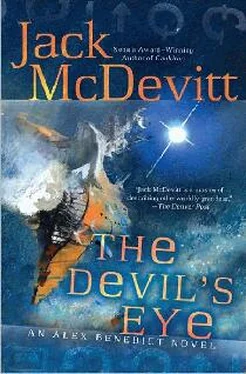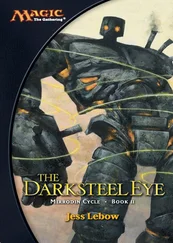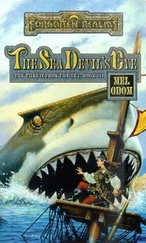Jack McDevitt - The Devil's Eye
Здесь есть возможность читать онлайн «Jack McDevitt - The Devil's Eye» весь текст электронной книги совершенно бесплатно (целиком полную версию без сокращений). В некоторых случаях можно слушать аудио, скачать через торрент в формате fb2 и присутствует краткое содержание. Жанр: Фантастика и фэнтези, на английском языке. Описание произведения, (предисловие) а так же отзывы посетителей доступны на портале библиотеки ЛибКат.
- Название:The Devil's Eye
- Автор:
- Жанр:
- Год:неизвестен
- ISBN:нет данных
- Рейтинг книги:4 / 5. Голосов: 1
-
Избранное:Добавить в избранное
- Отзывы:
-
Ваша оценка:
- 80
- 1
- 2
- 3
- 4
- 5
The Devil's Eye: краткое содержание, описание и аннотация
Предлагаем к чтению аннотацию, описание, краткое содержание или предисловие (зависит от того, что написал сам автор книги «The Devil's Eye»). Если вы не нашли необходимую информацию о книге — напишите в комментариях, мы постараемся отыскать её.
The Devil's Eye — читать онлайн бесплатно полную книгу (весь текст) целиком
Ниже представлен текст книги, разбитый по страницам. Система сохранения места последней прочитанной страницы, позволяет с удобством читать онлайн бесплатно книгу «The Devil's Eye», без необходимости каждый раз заново искать на чём Вы остановились. Поставьте закладку, и сможете в любой момент перейти на страницу, на которой закончили чтение.
Интервал:
Закладка:
It was on the whole a depressing hour and I was glad when it was over. Alex had found a couple more who'd seen her, and who'd thought something might be wrong. But nobody had pursued the issue with her. "I talked with Cory again," he said. "And-?" "She bought a new notebook after she got home from Salud Afar." "What happened to the old one?" "Apparently left behind." On the way home, he mentioned that he'd gotten the name of her psychiatrist.
FOUR
Trust your instincts, Shiel. In the end, it's all you've got.
- Nightwalk
The painful truth about humanity is that the only people who can't be bought are the fanatics. Clement Obermaier was not a fanatic. He was the authorizing psychiatrist in Vicki's case. And when Alex offered to contribute substantially to a fund in which he had an interest, he discovered a way around the ethical dilemma posed by the need to talk about a patient. Alex met him at Cokie's Place, a cabaret in the mountains north of St. Thomas. Afterward, he reconstructed the conversation for me.
Obermaier apparently thought Alex hoped there'd be a manuscript around somewhere. If there were, it would be worth a considerable sum. "At first," Alex said, "it was pretty obvious he was hoping he could talk to me, collect the contribution, but not tell me anything." "So what did he tell you?" "Somebody did a lineal block on her." "A what ?" "It's a procedure that's used with psychotic patients. Or with those who have extreme emotional problems. It allows the doctors to isolate a memory, or a set of memories, and prevent the patient from acting on them. From even talking about them." "Why would they want to do that?" "It can negate a wish for vengeance, for example. Or prevent stalking. That sort of thing." "So who used it on her? Why would they do it?" "Obermaier has no idea. There's nothing in her medical record." "Which means it was an illegal procedure." "Yes." "Can they estimate when it happened?" "He's pretty sure it was within the last year." "So what you're telling me is that she had some sort of specific memory that was locked away. She couldn't even tell anybody what it was." "That sounds about right." "But the memory was still there." "Yes." "Why wouldn't they-whoever did it-just do a mind wipe?"
"If we can find them, we'll ask. My guess would be that you can't hide a complete memory abstraction. I mean, the poor woman wouldn't even have been able to find her way home." "Couldn't this guy help her? Other than by removing her memory completely?" "He says he tried. But apparently lineal blocks tend to be permanent." "So he did the extraction because she was having a problem with the lineal block? Do I have that right?" "They did the extraction because she requested it." "Couldn't he have refused?" "He said he saw no recourse except to allow her to proceed." "Why?" "He said that, left to herself, she might have committed suicide." "You think it happened on Salud Afar?" "I don't think there's any doubt." "Are you suggesting maybe she ran into a real werewolf? Something like that?" "I think she found out something she wasn't supposed to know."
Two days later, Alex had something he wanted me to watch. "This is from the Nightline Horror Convention," he said. "It took place a few days before Vicki left for Salud Afar. She was among the guests, and this is one of her panels." The hologram blinked on. Four people at a table. Vicki at one end. I could hear an audience behind me. A tall redheaded man sitting beside her held up his hand, and the crowd quieted. "My name's Sax Cherkowski. And I just want to say my latest novel is Fright Night . I'm the moderator of the panel, and I'd like to take a moment to introduce everyone. We'll be talking about how to set mood, which is to say, how to scare the reader." We fast-forwarded through most of the comments until it was Vicki's turn to speak. "It doesn't have to be dark," she said. She used a dazzling smile to demonstrate that all the mummies and vampires were in fun. "It doesn't have to be gloomy. All you need is a hint that you're setting the stage. The wind suddenly becomes audible. "It might be two o'clock in the afternoon in an office building with a thousand people moving around. But if you know what you're doing, you can still arrange things so that every time someone opens a door, your reader will jump."
The panelists took turns responding to questions from the moderator and the audience. Vicki didn't really talk . She performed . She sparkled. The audience loved her. "Keep in mind," she told them, "that you're not telling a story. You're creating an experience. When those floorboards creak, your reader should hear it. When a log falls in the fireplace, your reader should jump. That means if you write anything that doesn't move the action forward, throw in an adjective you don't need, do anything that doesn't keep things going, you remind the reader that she's in a comfortable chair at home reading a book. When that happens, everything you've worked to accomplish goes away."
Alex let it run for about twenty minutes. Vicki held the audience in her hand. She got laughs, collected applause, traded quips with the other guests, joked with people in their seats, and was the star of the show. Then he showed me a second panel in which she tried to explain why people love to be scared. She was, if anything, even better. "This next," said Alex, "is a teachers' luncheon. She was the guest speaker." A long table appeared. A tall, rangy man stood at a lectern and introduced her. While he delivered accolades and the applause heated up, she took her place beside him. She thanked everyone for coming, announced that she would be talking about the importance of literacy and the critical role teachers play in the process of enlightening the rest of us, and she proceeded to do so. In a workmanlike, methodical manner. She was good, but the energy, the flash and dazzle, were gone. They listened, and when she'd finished,
they applauded politely. She was a different woman. Her eyes drifted around the room; her tone wasn't flat, but- Alex shut down the sound. "This one," I said, "was after she got back." He looked into the center of the room, where the hologram had been playing. "Yes. She'd been home six days."
Every world has its uneasy places, sites where gruesome killings, real or mythical, have taken place. Where spirits are said to be in command. Where people hear things whispering in the wind. Most of these locations, of course, are the products of people with overactive imaginations. And sometimes they are enhanced by entrepreneurs, interested in attracting tourists. Oh, yes, madame, up there on the hill, when the moon is high, Miller's dead daughter can still be seen. Usually near the large tree right on the eastern edge. She always wears white. If you run a search for such places, a substantial number of them turn up on Salud Afar: haunted buildings, haunted forests, a river with a demonic boatman, another river that is home to the spirit of a young woman drowned trying to reach her lover, a temple in which high priests (supposedly) had lopped off people's heads and where the screams could still be heard at certain times of the year. And there was even a phantom aircraft. My favorite was a laboratory, abandoned centuries ago, which locals claimed had once produced a time machine. Members of the long-dead staff, it was claimed, still showed up on occasion, their earlier selves traveling happily through the ages. "Why?" I asked Alex. "How come there's so much nonsense on this one world? Do those people really buy into this stuff?" Alex had been in a somber frame of mind since the memorial service. Ordinarily he'd have responded with a detailed analysis, attributing the effect perhaps to starless skies, or romantic trends in the literature. But he hadn't recovered his customary good spirits. "I've not been there," he said. "But I doubt the stories have anything to do with the credibility of the inhabitants." "What then?" "I don't know. Maybe we should ask a sociologist." "You have a theory." He nodded. "I can suggest a possibility." "You want to share it?" "Salud Afar, until its revolution thirty years ago, had suffered under six hundred years of authoritarian rule. Worldwide. Think about that. No place to hide. The only escape was off-world, and the government had to okay it before you could leave." His eyes narrowed. "I hate to think what life must have been like." "Six hundred years?" I said. "Under the same family. The Cleevs. It was a place where you had to keep your mouth shut. And you never knew when the Bandahr's thugs were coming through the door." "That was the Cleev family?" "Yes." "What's your point?" "Maybe none. But I suspect, when things get bad like that, when there really are monsters running loose, people tend to invent fantasies they can cope with. It might be an escape mechanism and maybe reassurance at the same time, because they know vampires don't exist. And they aren't nearly as terrible as what they face in real life but don't dare talk about."
Читать дальшеИнтервал:
Закладка:
Похожие книги на «The Devil's Eye»
Представляем Вашему вниманию похожие книги на «The Devil's Eye» списком для выбора. Мы отобрали схожую по названию и смыслу литературу в надежде предоставить читателям больше вариантов отыскать новые, интересные, ещё непрочитанные произведения.
Обсуждение, отзывы о книге «The Devil's Eye» и просто собственные мнения читателей. Оставьте ваши комментарии, напишите, что Вы думаете о произведении, его смысле или главных героях. Укажите что конкретно понравилось, а что нет, и почему Вы так считаете.












